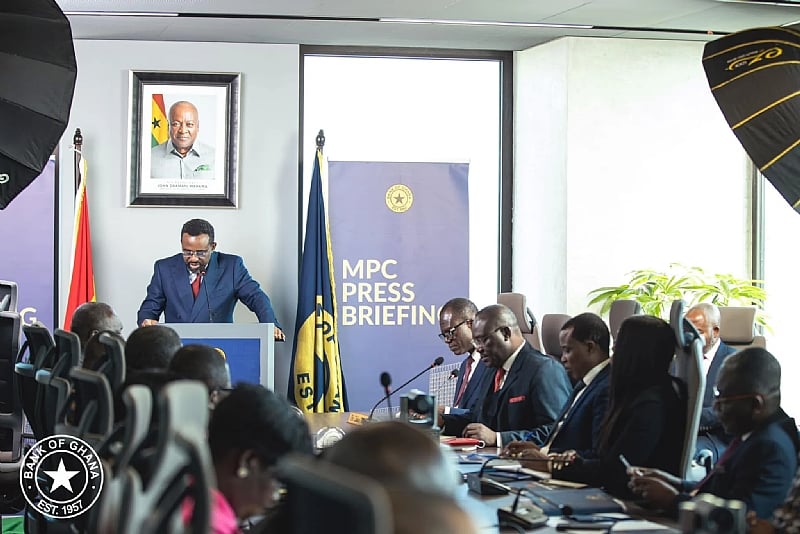Dissent Within Ghana’s Monetary Policy Committee: A Debate Over Raising Interest Rates
The Monetary Policy Committee (MPC) of the Bank of Ghana recently decided to increase the policy rate by 100 basis points, raising it from 27% to 28%. This decision, however, was not unanimous. Two out of the five MPC members voted against the increase, arguing that maintaining the rate at 27% would be a more prudent approach, fostering a balance between inflation control and economic growth. Their dissenting opinions reveal a broader debate within the committee about the optimal path for Ghana’s monetary policy.
Arguments Against the Rate Hike: A Focus on Stability and Growth
Both dissenting members emphasized the positive trajectory of key economic indicators, suggesting that further tightening was unnecessary. They pointed to the relative stability of the Ghanaian cedi, supported by increased remittance inflows, robust gold exports, and the successful "Gold for Reserves" program. These factors, they argued, had eased external pressures on inflation and exchange rate volatility. Furthermore, they highlighted the improving balance of payments position, exceeding IMF targets and bolstering foreign reserves, which provides a cushion against external shocks.
Domestically, the dissenting members noted the ongoing disinflationary trend, with headline inflation declining for two consecutive months. They argued that existing liquidity management tools were sufficient to control excess liquidity without resorting to a rate hike. Economic growth, demonstrating resilience with a 5.7% expansion in 2024, driven by sectors like mining, ICT, and construction, further supported their argument against tightening. Improving consumer and business confidence, reflected in declining inflation expectations, signaled confidence in the current monetary policy stance.
While acknowledging persistent food inflation due to supply-side constraints, the dissenting members argued that addressing this issue required structural interventions rather than monetary policy adjustments. Focus should be placed on tackling the root causes of food supply challenges rather than relying on interest rate hikes. They advocated for a steady policy rate to support the ongoing disinflation process without hindering economic growth momentum.
Arguments For the Rate Hike: Addressing Stubborn Inflation
The majority of the MPC, however, voted in favor of the rate hike, emphasizing the need to restore price stability. They acknowledged the recent decline in inflation but stressed that it remained “stubbornly high,” driven by both global and domestic factors. Globally, they pointed to rising interest rates, trade conflicts, and geopolitical tensions as contributors to increased uncertainty and inflationary pressures, particularly in emerging markets like Ghana.
Domestically, the majority acknowledged the positive GDP growth in 2024 but highlighted the persistent stickiness of inflation, especially food inflation, exacerbated by adverse weather conditions affecting crop yields. Despite the marginal easing of overall inflation, they argued that the prevailing rate remained significantly above the target, necessitating further policy tightening. The rate hike was presented as a necessary measure to curb inflation and anchor inflation expectations.
Transparency and Accountability: Publishing Dissenting Views
The public disclosure of the dissenting views within the MPC marks a new era of transparency for the Bank of Ghana. This initiative, introduced by the new Governor, Dr. Johnson Asiamah, aims to enhance accountability and build public trust in the central bank’s decision-making processes. By revealing the different perspectives within the committee, the Bank of Ghana seeks to foster a more informed public discourse on monetary policy and its implications for the economy.
The Balancing Act: Inflation vs. Growth
The differing views within the MPC highlight the complex trade-offs inherent in monetary policy decisions. The dissenting members prioritized maintaining economic growth momentum and emphasized the positive impact of existing policies on inflation and exchange rate stability. They viewed the rate hike as an unnecessary tightening that could potentially stifle economic activity. The majority, on the other hand, prioritized bringing inflation down to the target range, viewing the persistent high inflation as a greater threat to macroeconomic stability.
Implications for Ghana’s Economy
The debate within the MPC and the ultimate decision to raise the policy rate will have significant implications for Ghana’s economy. Higher interest rates can help control inflation by reducing consumer spending and investment, but they can also dampen economic growth. The effectiveness of the rate hike in curbing inflation will depend on a variety of factors, including the responsiveness of the economy to interest rate changes, the evolution of global economic conditions, and the success of government efforts to address supply-side constraints, particularly in the food sector.
Moving Forward: Navigating Uncertainty
The Bank of Ghana faces the challenging task of navigating a complex and uncertain economic environment. Balancing the need to control inflation with the desire to support economic growth requires careful consideration of various factors and a flexible approach to policymaking. The public disclosure of dissenting views within the MPC provides valuable insights into the complexities of monetary policy decisions and fosters greater transparency and accountability in the central bank’s operations. As the Ghanaian economy evolves, the ongoing debate within the MPC will continue to shape the trajectory of monetary policy and its impact on the nation’s economic future.














